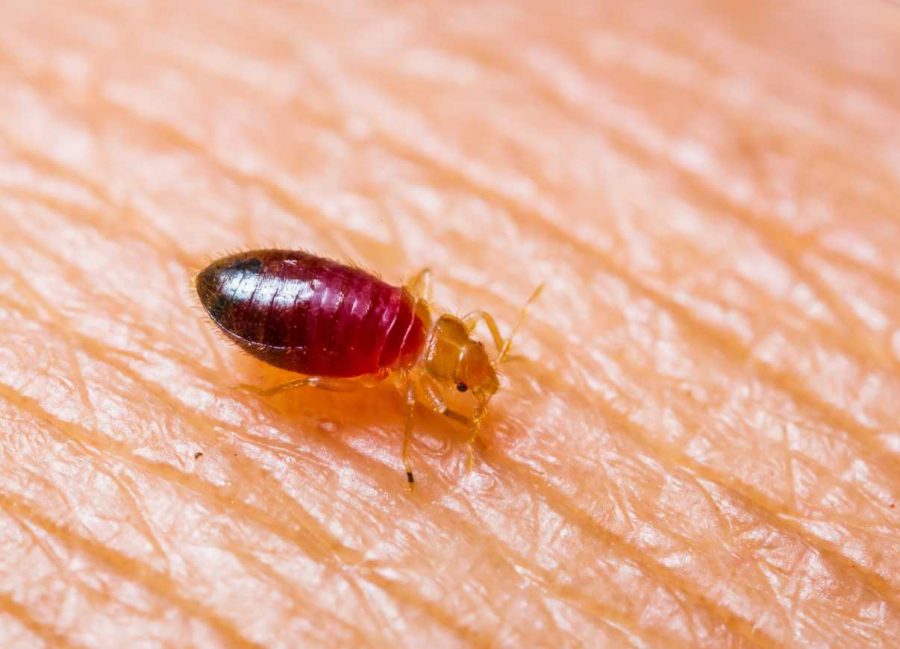During the week before Thanksgiving break, students in Carmichael Towers reported bed bugs in their suite. According to Jim Kramka, senior director of housing operations for ResEd, a student in the suite provided a picture of the insects, and the pest control team confirmed that they were bed bugs, prompting ResEd to take action.
“The way that we respond is that we have a protocol,” Kramka said. “We go to room and do a visual inspection, to see bugs directly or see some sign. If we see them or signs of them, then we know we do have them and we move into treating the rooms. If we don’t see bed bugs, then we put some monitoring devices in the rooms and come back and check on them every other day, looking to see if we attracted any bugs. Sometimes we don’t because someone got other bites, like mosquitos, and there are no bed bugs. In this case, the resident took a picture and sent it to us, and the pest control team confirmed that we had a bed bug, so we started our protocol to eradicate them.”
The treatment process for bed bugs requires the residents to evacuate their rooms for seven days and leave behind all belongings that may be affected by the insects so that the infestation cannot spread, including clothes and books. The residents may only bring a few articles of clothing after they have been properly laundered and basic toiletries that can be visually inspected for bed bugs.
This process began just before Thanksgiving break. Only the room of the resident who reported the infestation was evacuated and treated before break, and then the entire suite was treated during break once it was vacant in order to minimize the inconvenience to students. Upon the residents returning to campus, the treatment proved to be unsucessful, and so the residents have since been moved to another undisclosed residence hall until the end of the semester.
Since the treatment began, students in an adjoining suite also suspect bed bugs in their rooms and have accepted offers to move residence halls until the rooms are inspected and treated.
While there are rumors of other infestations in Towers, only one case has been reported as of now.
Additionally, rumors that there were bedbugs in Central Library were started when The Slant, Vanderbilt’s humor and satire publication, reported that there were bedbugs around the library. In reality, library staff found bedbugs in a breakroom in the basement over a month ago. The room was immediately sealed off and treated, and 170 monitors were installed throughout the library to assure that the bugs did not spread, according to Valerie Hotchkiss, University Librarian. The testing period ended last Monday, with the library being found to be “completely clear of any infestation.”
“Libraries are important places for study, contemplation, and congregation,” Hotchkiss said. “We want our students to feel comfortable and safe in our libraries.”
The Slant has since updated their post to reflect the changes.
Bed bugs, while annoying, carry only minor medical implications. There is no known human transmission of disease through bed bugs. However, their bites can cause welts to form and some people may experience allergic reactions. Bed bugs are also largely active at night, meaning that one is likely to wake up with bites if they have an infestation.
“People don’t like bugs and they don’t like getting bitten,” Kramka said. “The bites, even though they are not transmitting a disease, cause some people to react more than others. Some people get large welts and blisters, but those cases are very rare. In general, they are not considered a health problem; they are an annoyance problem.”
In terms of prevention, bedbugs can be nearly impossible to spot.
“Prevention is really difficult because bedbugs are small,” Kramka said. “They seek out humans. They are attracted by body heat and by carbon dioxide. That is why they are called bed bugs. You are a stationary target, you’re warm, and you’re exhaling carbon dioxide. So if they are around, they will find you.”
Bedbugs became a more frequent problem in the U.S. during the early 2000s, due to resistance to insecticides and increased travel. At Vanderbilt, two or fewer cases has been the norm since Kramka began working here around 17 years ago.
As far as diagnosing an infestation, Kramka suggested that students first go to the Student Health Center.
“I think the thing for students to do if they suspect that they have bed bugs, and typically that is going to be welts when they wake up, maybe more than one bite, maybe in a line, a straight line or a curved line, they would then want to go to Student Health just to take a look because it is not necessarily a bed bug bite,” he said.
Kramka compared the bedbugs situation on campus to an incident of head lice on campus a few years ago. When a few students reported cases of head lice, the campus was panicked, but out of 100 students who took the university up on complimentary checks for lice, none were carrying the pests.
“I do understand the concern and the fear of getting it,” Kramka said. “They are not uncommon, and it has nothing to do with being dirty, it just happens, and bed bugs are just like that.”
However, if a student does believe that there are bedbugs in their residence, they should report it to their area maintenance supervisor as soon as possible, Kramka said.
“Early reporting is a great help to us,” he said.











